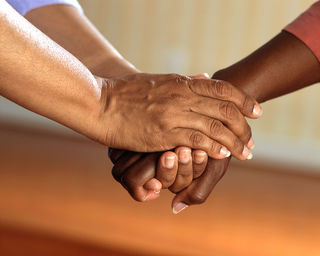Mindfulness
Presence, Pain and Compassion
Mindfulness relieves suffering—and not just our own.
Posted January 8, 2016
If you get lucky, you might find someone/To help you get over the pain that will come. (Tom Petty, "Wake Up Time")
The slightest move and this river mud pulls me further down/John's at my side but he's not noticing that I'm drowning. (Cowboy Junkies, "Speed River")
Pain is inevitable. At some point all of us will have injuries, stresses, and heartbreaking losses. The responses of those around us profoundly affect how much we suffer when these things happen. When others see and respond to our pain, it hurts less.

Plenty of studies have shown that human touch has an analgesic effect–for example, touch relieves headaches; even sharing our pain simply by saying "Ow!" can make it more bearable. We seem to know intuitively to reach out to people we care about when they're in pain. It's why we hug a grieving friend, or hold a child who skinned her knee.
It's hard to be alone when we're in pain. It's even harder to be alone with our pain when there are people nearby who could reach out to us. Many people have told me that ending a relationship is less lonely than being with someone who ignores their pain.
If you think right now about a tough time in your life, you can probably remember someone who was truly there for you. Maybe it was someone you expected to be there, or maybe the person surprised you. Either way, you remember the people who saw and responded to your need. Sadly we also tend to remember the people who let us down when we most needed their help.
How can we be the kind of friend, partner, or family member who comes through for the other person at crucial moments? First we have to recognize the other person's struggle. Recognition requires:
- Awareness. Being aware of someone's pain requires our attention. We're all busy, and sometimes in our busyness we fail (sometimes conveniently) to see the person in front of us.
- Acceptance. Sometimes even if we notice the person's need, we might dismiss it. The "bystander effect" is a perfect demonstration of our ability to deny what painfully obvious. We might even be tempted to judge the other person, to "blame the victim." When we accept the other person's pain for what it is, we can respond with compassion.
Awareness with acceptance is a concise definition of mindfulness–seeing what is, as it is. At this point probably everyone knows that mindful awareness, like sleep, is good for basically everything. Bringing our attention into the present and letting go of our tendency to judge everything as good or bad can have profound effects on our well-being. (For a very accessible summary of the positive effects of mindfulness, see this blog post).

A recent study showed that practicing meditation–a very common mindfulness practice–makes a person more willing to help others. Participants in the mindfulness condition did 8 weeks of meditation practice; those in the control condition were on a waiting list for the same length of time.
The researchers could have asked participants after the 8 weeks, "How likely are you to help someone in need?" The problem, of course, is that most of us would say, "Oh, yes, I definitely would help out. Absolutely." And we might, or we might not.
A better test involves our behaviors, and so this group of researchers did what many others have done: they devised a scenario to test actual behavior, without letting the research participants know what was up.
At the end of the 8 weeks each individual came into the research lab and sat in a waiting room that had 3 chairs. The other two chairs were taken by individuals who were actually part of the research team (“confederates”).
The moment of truth arrived when a third confederate entered the waiting room on crutches and wearing a walking boot, who pretended to be in obvious discomfort. From the description, any conscious human being could see that this person could use a seat. Neither of the seated confederates offered his or her chair to the person on crutches; the question was whether the research participant would give up his or her chair for this person.

The results were striking. In the control group, only 3 of 19 individuals (16%) offered their chair to the person on crutches. In contrast, half of the individuals in the meditation group (10 of 20) gave up their chair so the person could sit down. In other words, meditation practice tripled the likelihood that a person would respond with compassion to someone in need. (It is noteworthy, of course, that even half of the meditation group chose to keep sitting and let the person on crutches stand.)
Sometimes taking time to meditate can seem like a selfish act. However, this study confirms what many meditators have known intuitively, that increasing our mindful awareness is good not only for ourselves but for the people around us.
Whether or not you meditate, you might practice bringing mindful awareness to your interactions with others. We can listen with our full attention, focusing on the person's face and eyes when she's talking. We might ask ourselves questions such as:

- What is this person feeling?
- What does she need?
- Am I willing to open to her experience just as it is?
We can also practice looking at others with "beginner's mind," as though it's the first time we're seeing them. It's easy to see our idea of a person–especially if we've known him for a long time–and not see the actual person in front of us. We're often surprised what we see when we take a fresh look.
When we practice being present and opening our awareness to those around us, we strengthen our relationships. The result is more meaningful connections with others, and less suffering in the world.
♦♦♦
Portions of this post appeared on sethgillihan.com.




